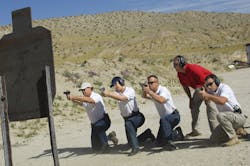Make Training Fun (Again)
Making it entertaining
Entertainment is all in the presentation. Now, don’t misunderstand, law enforcement training is serious business and many instructors might argue that there should be nothing entertaining about it. It should be delivered and received with as much seriousness as the skills and knowledge taught will impart when used. That’s a given; however, if the instructor in a given program is acting like the learning is a death sentence, then no one wants to be there. The outlook and attitude of the instructor during the course presentation largely sets the tone for how it will be received. Too many student officers come into the training grumbling because they have to be there and there’s always someplace they would rather be—even if it’s working the street.
From the very opening moment when the instructor introduces him/herself and begins the presentation—which usually opens with the administrative stuff of “how long, will or won’t be a test, here’s where the bathrooms are, and this is when we should be done”—the tone is set. Jokes may not have a place in many training programs, but a cheerful happy approach to being there can change how the next few hours go.
Almost all training is given for one (or more) of three reasons:
- skills maintenance
- policy change, or...
- case decisions.
All three can be dry and boring because...
- It’s tedious and repetitive
- It’s boring but mandatory
- It’s perceived as inevitably restricting how we do our jobs.
The job facing an instructor is to remove the tedium; craft it as interesting and explain how it’s going to make doing the job easier.
Now, we freely admit, the last one may take a bit of...creativity. Quite often, especially of late, new policies being handed down, whether ultimately from a governing body (city council, county council, state legislature) or from the agency commander (chief or sheriff) seem unnecessarily restrictive. Many officers (our editorial director included) look back and think: “We’ve done this job this way for decades without complaint. Why now?” These new policies often add a new task or control on how we do a different task.
The goal of the instructor is to show how this new additional piece will ultimately benefit the officers and further assist in convicting the offender. Consider body worn cameras as the example. When they first hit the market and were pushed hard “to protect the civil rights of suspects,” law enforcement moaned. Another thing to wear. Another camera monitoring our every movement and word. But, years later, body worn cameras have proven to be excellent tools for evidence collection and have served to increase conviction rates—so much so that some civil rights organizations now claim they are an infringement of personal privacy. As an instructor, figure out what your “spin” is going to be and build the course accordingly.Making it fun
Hands down, the most boring class you can teach is report writing. Inevitably we make it so and undo our own efforts to some extent. Yes, the part about filling in blocks and picking the correct identifier from a pull down menu is tedious and can be boring. That recognized, how often does the sergeant have to correct something from a pull down menu? More often than not, the bigger challenge is the narrative section. Too many officers today have a challenge with writing in general; any type of creative writing, descriptive text, tense, conjugation and more.
But improving writing skills in general doesn’t have to be boring. It’s about the skills, not the text. Making a report writing class more fun, as the example, could be as simple as giving the student officers a writing assignment such as, “Give me 500 words describing your dream car and why it is.” It’s a topic many of them will enjoy. “Write me a 500 word description of the coolest house you’ve ever been in.” “Write me 500 words about the best vacation you’ve ever had.” What you want to correct isn’t the topic; it’s the way the writing is produced.
Most other topics can be managed the same way to some extent. Every instructor has enough time on the street to have anecdotal stories that can be shared about something related. Make it appropriate. Tell the story as if someone from the command staff was sitting in your class and someone from HR was sitting next to them. Entertain...don’t just instruct.
Making it competitive
This is actually the easiest one. All you need is a prize. It can be something tangible like a new equipment organizer for a patrol vehicle seat, or a flashlight the agency has a spare of. It can be something less tangible like a half day off or attendance at some highly desired training program. The point is that if there is something for the students to compete to receive, then they are more motivated to do well in the program.
Obviously this is something that might need to be worked out with the command staff. Depending on the size of your agency, that might mean approval from a sergeant or lieutenant. If the agency is smaller, it might mean getting the chief to agree. Whatever it is, get it in writing and create a gift certificate good for it. At the end of the class, you want “the winner” to be handed something tangible, even if the prize won isn’t. “This gift certificate is good for four hours of paid leave, without reduction in the officer’s leave balance, upon prior approval of the time by the officer’s supervisor.”
Whoever gets the highest score on the test, wins. If there’s a tie, be prepared to hold some type of tie-breaker. If it’s defensive tactics or a firearms qualification day, set up a competitive course for score-vs-time and let those in attendance compete (with due consideration for safety). Give away a hat, a pair of gloves, or a gift card from the local favorite eatery (that the eatery management is usually happy to donate).
If you can manage to catch the attendees’ attention at the beginning of the course, entertain them throughout and give them something to win at the end, the training won’t be just another tedious boring class they are forced to attend. And a happy side effect of that will be your improved appreciation as an instructor. Instead of student officers dreading having to attend your courses, they’ll look forward to it. As that outlook compounds, the job gets even easier.
About the Author
Lt. Frank Borelli (ret), Editorial Director
Editorial Director
Lt. Frank Borelli is the Editorial Director for the Officer Media Group. Frank brings 20+ years of writing and editing experience in addition to 40 years of law enforcement operations, administration and training experience to the team.
Frank has had numerous books published which are available on Amazon.com, BarnesAndNoble.com, and other major retail outlets.
If you have any comments or questions, you can contact him via email at [email protected].



